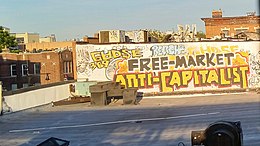
Back أناركية السوق الحرة Arabic Tržní anarchismus Czech Libermerkata anarkiismo Esperanto آنارشیسم بازار آزاد Persian Markkina-anarkismi Finnish Piaci anarchizmus Hungarian Anarchismo di libero mercato Italian 自由市場無政府主義 Japanese საბაზრო ანარქიზმი Georgian Рыночный анархизм Russian

| Part of a series on |
| Anarchism |
|---|
 |
Market anarchism,[1] also known as free-market anti-capitalism,[2] is the branch of anarchism that advocates a free-market economic system based on voluntary interactions without the involvement of the state. A form of individualist anarchism[3] and libertarian socialism,[4] it is based on the economic theories of mutualism and individualist anarchism in the United States.[2]
Samuel Edward Konkin III's agorism is a strand of left-wing market anarchism that has been associated with left-libertarianism.[5] Anarcho-capitalism has also been referred to synonymously as free-market anarchism [6][7][8][9] due to contending definitions of the terms ‘markets’ and ‘capitalism’ which are not used by free-market anti-capitalists.[10]
- ^ Long, Roderick T. (January 1, 2012). "Left-Libertarianism, Market Anarchism, Class Conflict and Historical Theories of Distributive Justice". Griffith Law Review. 21 (2): 413–431. doi:10.1080/10383441.2012.10854747. S2CID 143550988 – via Taylor and Francis+NEJM.
- ^ a b Cite error: The named reference
LibertarianLeftwas invoked but never defined (see the help page). - ^ Chartier, Gary; Johnson, Charles W. (2011). Markets Not Capitalism: Individualist Anarchism Against Bosses, Inequality, Corporate Power, and Structural Poverty. Brooklyn: Minor Compositions/Autonomedia.
- ^ Carson, Kevin. "Socialism: A Perfectly Good Word Rehabilitated". Center for a Stateless Society. "But there has always been a market-oriented strand of libertarian socialism that emphasizes voluntary cooperation between producers. And markets, properly understood, have always been about cooperation. As a commenter at Reason magazine's Hit&Run blog, remarking on Jesse Walker's link to the Kelly article, put it: "every trade is a cooperative act." In fact, it's a fairly common observation among market anarchists that genuinely free markets have the most legitimate claim to the label "socialism."
- ^ "Anarchism". In Gaus, Gerald F.; D'Agostino, Fred, eds. (2012). The Routledge Companion to Social and Political Philosophy. p. 227. "Later [left-libertarianism] became a term for the left or Konkinite wing of the free-market libertarian movement, and has since come to cover a range of pro-market but anti-capitalist positions, mostly individualist anarchist, including agorism and mutualism, often with an implication of sympathies (such as for radical feminism or the labor movement) not usually shared by anarcho-capitalists."
- ^ Carrier, James G. (1997). Meanings of the Market: The Free Market in Western Culture (1 ed.). Oxford: Berg. p. 107. ISBN 1-85973-149-X.
- ^ Miller, G. Tyler; Paul, Ellen Frankel; Miller Jr., Fred D., eds. (1993). Liberalism and the Economic Order, Part 2. p. 115.
- ^ Long, Roderick T.; Machan, Tibor R. (2016) [2008]. Anarchism/Minarchism: Is a Government Part of a Free Country?. Ashgate.
- ^ Hoffman, John; Graham, Paul (2006). Introduction to Political Theory. p. 243.
- ^ Chartier, Garry. Johnson, Charles H. Markets Not Capitalism: Individualist Anarchism Against Bosses, Inequality, Corporate Power, and Structural Poverty. Brooklyn: Minor Compositions/Autonomedia. pp 60-61. “In order to get clear on the topic in a conversation about ‘Free Market Anticapitalism,’ the obvious points where clarification may be needed are going to be the meaning of capitalism, the meaning of markets, and the meaning of freedom in the market context… market anarchists have spent a lot of time…the possibility of disentangling multiple senses of ‘capitalism’…The meaning of the term is obviously central to any free market economics…Pro-capitalist economists have often suggested such a broad understanding of ‘markets’ even if the have not fully understood…its implications. For example Murray Rothbard….”
© MMXXIII Rich X Search. We shall prevail. All rights reserved. Rich X Search